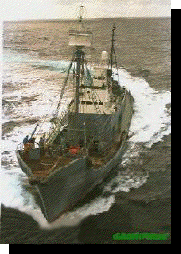Special Action Alert - U.S.A.
| Home > Action Alerts > Northern Right Whales | SITEMAP |
Endangered Northern Right WhalesSPECIAL NAVIGATION NOTICE- NOTICE TO MARINERS -
You are advised that the endangered Right Whale inhabits areas along the U.S. Eastern Seaboard. In the U.S. Northeast, right whales inhabit areas within the Ambrose and Boston Harbor traffic lanes in the spring and summer. NOAA has designated Cape Cod Bay and the region east of Cape Cod as Critical Habitat for this species and has identifed Stellwagen Bank National Marine Sanctuary as an additional area of importance. The whales also aggregate in the Precautionary Area within the Great South Channel in the spring. Mariners are requested to post a lookout for Right Whales as they approach these areas and to minimize their exit and entrance speeds to the extent possible to maintain safe handling of the vessel, preferably 5 knots or less, in the channels and precautionary areas to avoid ship-whale collisions. Intentional approach to Right Whales is prohibited and may result in a violation of federal or state laws. From December to March the coastal waters between Altamaha Sound, Georgia, and Sebastian Inlet, Florida, are the only calving grounds for the Right Whale. Vessel speeds upon exit and entrance into the ports of Miami, Florida, through Charleston, South Carolina should also be kept at a minimum. Right Whale sightings in these areas should be reported to Coast Gaurd Group Mayport via VHF-FM radio or to the Georgia Department of Natural Resources (800-272-8363). Northern Right WhalesRange from Maine to Florida and are often killed by commercial shipping and cruise boats and are killed or entangled by virtually every commercial fishery along the coast. There have been only 12 records of right whales off California (including one off Baja) this century, all since 1955. All indications are that the E. North Pacific population is exceedingly small and may be on its way out. No-one wants to see the last of the Right Whales killed off. If you do not want the U.S. to kill off a species of whale, then you have got to act.
Click here to visit the
|

